Bola Tinubu facts for kids
Quick facts for kids
Bola Tinubu
|
|
|---|---|
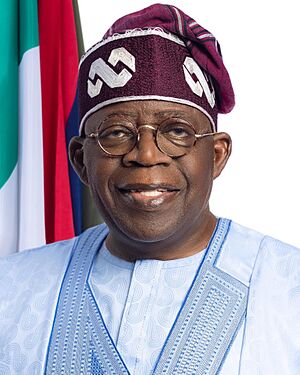
Official portrait, 2023
|
|
| 16th President of Nigeria | |
| Assumed office 29 May 2023 |
|
| Vice President | Kashim Shettima |
| Preceded by | Muhammadu Buhari |
| Federal Minister of Petroleum Resources | |
| Assumed office 21 August 2023 |
|
| President | Himself |
| Preceded by | Muhammadu Buhari |
| 12th Governor of Lagos State | |
| In office 29 May 1999 – 29 May 2007 |
|
| Deputy | Kofoworola Bucknor Femi Pedro Abiodun Ogunleye |
| Preceded by | Buba Marwa |
| Succeeded by | Babatunde Fashola |
| Member of the Nigerian Senate for Lagos West |
|
| In office 5 December 1992 – 17 November 1993 |
|
| Succeeded by | Wahab Dosunmu (1999) |
| Personal details | |
| Born |
Bola Ahmed Adekunle Tinubu
29 March 1952 Lagos, British Nigeria |
| Political party | All Progressives Congress (2013–present) |
| Other political affiliations |
|
| Spouse |
Remi Tinubu
(m. 1987) |
| Children | 6 |
| Relatives | Abibatu Mogaji (mother) Wale Tinubu (nephew) |
| Education |
|
Asiwaju Bola Ahmed Adekunle Tinubu (born on March 29, 1952) is a Nigerian politician. He is currently the 16th president of Nigeria, a role he has held since 2023. Before becoming president, he was the governor of Lagos State from 1999 to 2007. He also served as a senator for Lagos West in the early 1990s.
Tinubu grew up in southwestern Nigeria. He later moved to the United States to study accounting. In the 1980s, he returned to Nigeria and worked as an accountant for Mobil Nigeria. He then entered politics, becoming a senator in 1992. After a military government took over in 1993, Tinubu went into exile. He became an activist, working to bring democracy back to Nigeria.
In 1999, after Nigeria returned to civilian rule, Tinubu was elected Governor of Lagos State. He won re-election for a second term in 2003. After leaving office in 2007, he helped create the All Progressives Congress (APC) political party in 2013. In 2023, he was elected president of Nigeria.
Contents
Early Life and Education
Tinubu was born in Lagos. His mother, Abibatu Mogaji, was a well-known merchant in Lagos. Most reliable sources say he was born in 1952.
School Days
Tinubu went to St. John's Primary School in Lagos. He also attended Children Home School in Ibadan. In 1975, he moved to the United States for college. He studied at Richard J. Daley College and then at Chicago State University. There, he focused on accounting and management.
To pay for his studies, he worked various jobs. He was a dishwasher, a night security guard, and a taxi driver. He was a very good student and even made the honor dean's list. He also helped other students by teaching extra classes. In 1979, he graduated with a Bachelor of Science degree in Business Administration.
First Jobs
After college, Tinubu worked as an accountant for big American companies. These included Arthur Andersen and Deloitte. He gained experience in checking financial records and advising businesses. He also worked for Mobil Oil UK in London. Later, he joined Mobil Producing Nigeria Unlimited in the 1980s as a senior executive.
Tinubu was involved in community projects in Lagos. He helped raise money for groups that wanted to improve politics in the state. Eventually, he decided to leave his job at Mobil to focus fully on politics.
Early Political Journey
Tinubu's political career started in 1991. He joined the Social Democratic Party. He actively supported Moshood Kashimawo Abiola for president.
Serving in the Senate
In 1992, Tinubu was elected to the Nigerian Senate. He represented the Lagos West Senatorial District. In the Senate, he led the committee that handled banking, finance, and money matters.
After the 1993 presidential election results were cancelled, Tinubu helped start the National Democratic Coalition (NADECO). This group worked to bring back democracy and recognize Abiola as the election winner.
Time in Exile
After General Sani Abacha took power in 1993, Tinubu faced threats. He had to leave Nigeria for his safety. He joined NADECO members who were also in exile. They continued to fight for democracy. He returned to Nigeria in 1998 after Abacha's death. This led to Nigeria becoming a democracy again.
Before the 1999 elections, Bola Tinubu was supported by leaders of the Alliance for Democracy (AD). He won the AD party's primary election for Lagos State governor. In January 1999, he was elected Governor of Lagos State.
Governor of Lagos State (1999–2007)
As governor, Tinubu was a strong political leader. He was the only governor from his party, the AD, to win re-election in the southwestern states in 2003. This led to disagreements with the federal government. They argued over his decision to create 37 new local council areas in Lagos State. The Supreme Court eventually ruled in his favor.
During his eight years as governor, Tinubu started building new roads. These roads were needed for Lagos State's fast-growing population. He received many awards for his leadership. These included Best Governor in Nigeria in 2000. He also received an award for improving the living environment. Abia State University gave him an honorary law degree for his work in democracy and good governance.
Tinubu and his new deputy governor, Femi Pedro, won re-election in April 2003. He continued to face challenges from the federal government. They disagreed on whether Lagos State could create new local council areas. This led to the federal government holding back funds for local councils in the state.
In 2006, Tinubu tried to convince Atiku Abubakar, who was then Nigeria's vice president, to join his new party, the Action Congress of Nigeria (ACN). Abubakar did not accept Tinubu's offer to be his running mate.
Tinubu's time as Lagos State Governor ended on May 29, 2007. His successor, Babatunde Fashola, who was his former chief of staff, took office.
Before Becoming President (2007–2023)
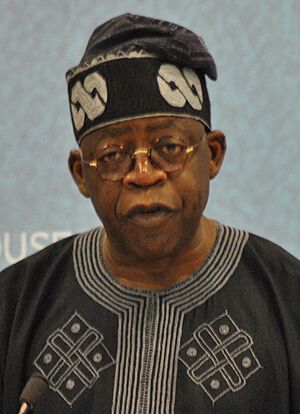
After the 2007 elections, Tinubu worked to unite different opposition parties. He wanted to create a "mega-party" that could challenge the ruling party. In February 2013, Tinubu helped create the All Progressives Congress (APC). This new party was formed by merging Nigeria's three biggest opposition parties.
All Progressives Congress
In 2014, Tinubu supported former military leader General Muhammadu Buhari. Buhari was popular in Northern Nigeria and had run for president before. Tinubu initially wanted to be Buhari's vice president. However, he later agreed to support Yemi Osinbajo, his ally, for the role. In 2015, Buhari and the APC won the election. This was the first time an acting Nigerian president lost to an opposition candidate.
Tinubu played an important role in Buhari's government. He supported government policies and helped manage the party. In 2019, he supported Buhari's re-election campaign, which was also successful.
Presidency (2023–present)
2023 Presidential Election
On January 10, 2022, Tinubu officially announced he would run for president. On June 8, 2022, he won the APC party's vote to become their presidential candidate. He defeated Vice President Yemi Osinbajo and Rotimi Amaechi.
On March 1, 2023, the INEC declared Tinubu the winner of the 2023 presidential election. He received 8,794,726 votes. This meant he won with 36.6 percent of the total votes. He also received at least 25 percent of the votes in 28 states, which was enough to win the presidency in one round. His main opponents were Atiku Abubakar and Peter Obi.
The election had some challenges. There were reports of issues at polling places. Some observers and groups raised concerns about the results. However, INEC declared Tinubu the winner after all state results were counted. His opponents challenged the results, but his government is now accepted internationally.
His Time in Office
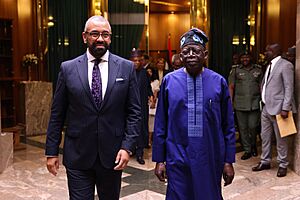
Tinubu officially became president on May 29, 2023. He was sworn in by the Chief Justice of Nigeria at a ceremony in Abuja. Many leaders from other countries attended the event.
In his first speech, Tinubu announced the removal of the government subsidy on fuel. This meant that the government would no longer pay part of the cost of fuel. This decision caused fuel prices to increase. The NLC, a national labor union, called for protests. However, these protests were later called off as talks with the government continued. The World Bank saw the removal of the fuel subsidy as a good step for Nigeria's economy.
On June 9, President Tinubu suspended Godwin Emefiele, the head of Nigeria's central bank. Emefiele was later arrested. This suspension was seen as a positive change. Five days later, the central bank removed all restrictions on foreign exchange trading. This allowed the Nigerian currency to fall to its lowest value ever. These financial changes are part of Tinubu's plan to improve Nigeria's economy.
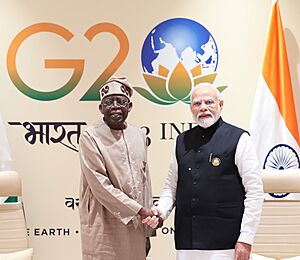
President Tinubu appointed Senator George Akume as the Secretary to the Government of the Federation. He also appointed Femi Gbajabiamila as his Chief of Staff. On June 9, Tinubu suspended the chairman of the EFCC, Abdulrasheed Bawa. Bawa was later arrested.
On June 19, President Tinubu appointed Mallam Nuhu Ribadu as the National Security Adviser. This appointment was seen as a change from the military leaders who usually held this position. Tinubu also retired many high-ranking military officers. This shows his plan for civilian leaders to have more control over the military.
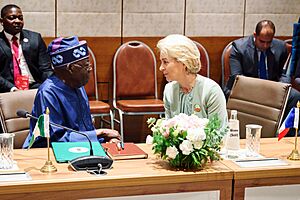
Tinubu made his first foreign visit as president to Paris on June 21. He attended a global financial summit there. He then went to London for a private visit.
In August 2023, he supported military action in Niger during a crisis there. On May 29, 2024, Tinubu signed a law to bring back Nigeria, We Hail Thee as the country's national anthem. This anthem was used from 1960 to 1978. It replaced Arise, O Compatriots.
Personal Life
Tinubu married Oluremi Tinubu in 1987. She is a former senator. They have three children together: Zainab, Habibat, and Olayinka. Tinubu also has three other children from previous relationships: Kazeem, Folashade, and Oluwaseyi.
His mother, Abibatu Mogaji, passed away on June 15, 2013, at the age of 96. His son, Jide Tinubu, died in London on October 31, 2017.
Tinubu is a Muslim.
Honours and Titles
National Honours
 Nigeria:
Nigeria:
 Grand Commander of the Order of the Federal Republic (GCFR) (received on May 25, 2023)
Grand Commander of the Order of the Federal Republic (GCFR) (received on May 25, 2023)
Traditional Titles
Tinubu holds two traditional chieftaincy titles. He is known as the "Asiwaju" of Lagos. He is also the "Jagaba" of the Borgu Emirate in Niger State.
See also
 In Spanish: Bola Tinubu para niños
In Spanish: Bola Tinubu para niños
- Jigi Bola
 | Georgia Louise Harris Brown |
 | Julian Abele |
 | Norma Merrick Sklarek |
 | William Sidney Pittman |

